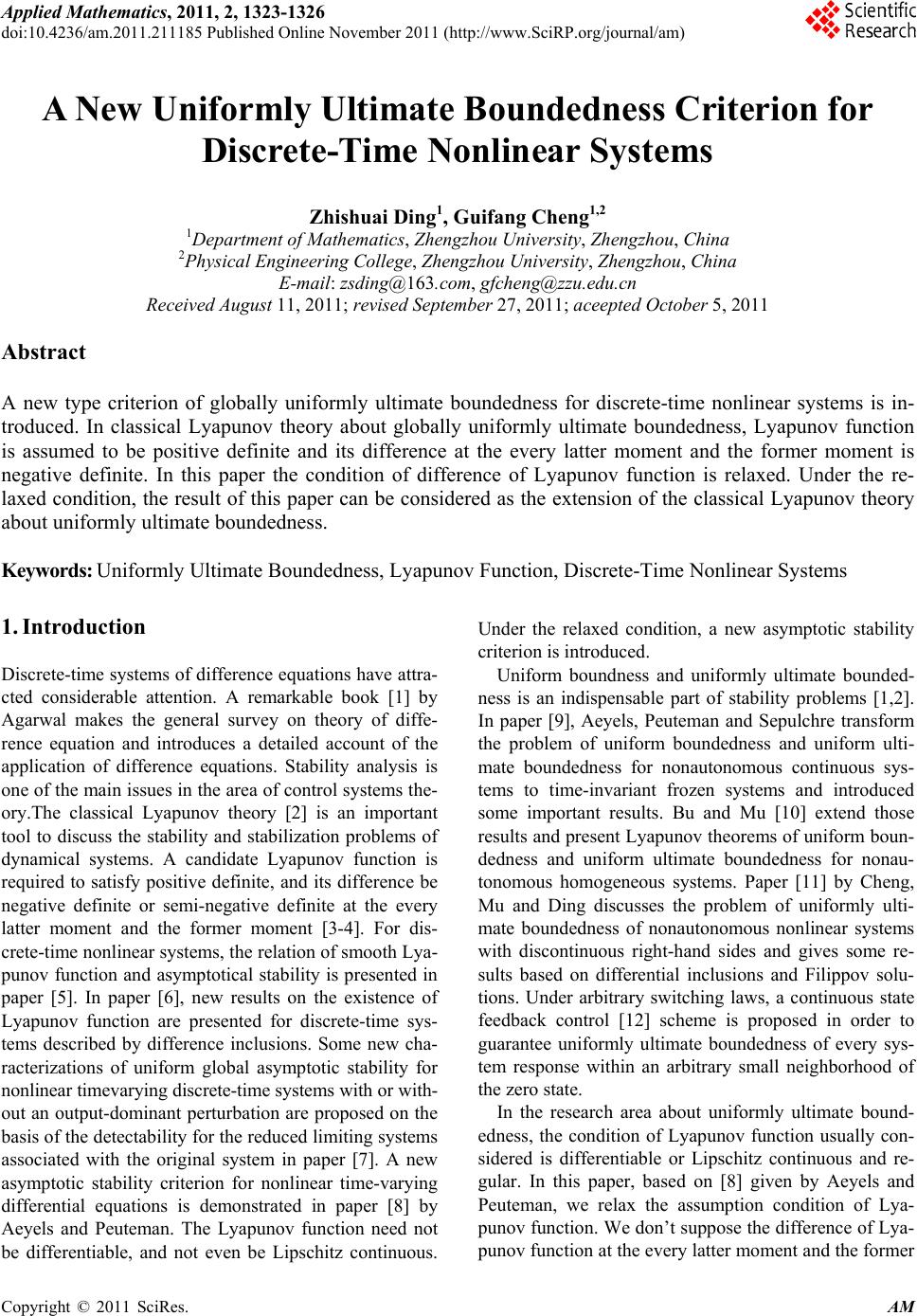
Applied Mathematics, 2011, 2, 1323-1326
doi:10.4236/am.2011.211185 Published Online November 2011 (http://www.SciRP.org/journal/am)
Copyright © 2011 SciRes. AM
A New Uniformly Ultimate Boundedness Criterion for
Discrete-Time Nonlinear Systems
Zhishuai Ding1, Guifang Cheng1,2
1Department of Mat hem at i cs, Zhengzhou Uni versi t y , Zhengzhou, China
2Physical Engineering College, Zhengzhou University, Zhengzhou, China
E-mail: zsding@163.com, gfcheng@zzu.edu.cn
Received August 11, 2011; revised September 27, 2011; aceepted O ct o ber 5, 2011
Abstract
A new type criterion of globally uniformly ultimate boundedness for discrete-time nonlinear systems is in-
troduced. In classical Lyapunov theory about globally uniformly ultimate boundedness, Lyapunov function
is assumed to be positive definite and its difference at the every latter moment and the former moment is
negative definite. In this paper the condition of difference of Lyapunov function is relaxed. Under the re-
laxed condition, the result of this paper can be considered as the extension of the classical Lyapunov theory
about uniformly ultimate boundedness.
Keywords: Uniformly Ultimate Boundedness, Lyapunov Function, Discrete-Time Nonlinear Systems
1. Introduction
Discrete-time systems of difference equations have attra-
cted considerable attention. A remarkable book [1] by
Agarwal makes the general survey on theory of diffe-
rence equation and introduces a detailed account of the
application of difference equations. Stability analysis is
one of the main issues in the area of control systems the-
ory.The classical Lyapunov theory [2] is an important
tool to discuss the stability and stabilization problems of
dynamical systems. A candidate Lyapunov function is
required to satisfy positive definite, and its difference be
negative definite or semi-negative definite at the every
latter moment and the former moment [3-4]. For dis-
crete-time nonlinear systems, the relation of smooth Lya-
punov function and asymptotical stability is presented in
paper [5]. In paper [6], new results on the existence of
Lyapunov function are presented for discrete-time sys-
tems described by difference inclusions. Some new cha-
racterizations of uniform global asymptotic stability for
nonlinear timevarying discrete-time systems with or with-
out an output-dominant perturbation are proposed on the
basis of the detectability for the reduced limiting systems
associated with the original system in paper [7]. A new
asymptotic stability criterion for nonlinear time-varying
differential equations is demonstrated in paper [8] by
Aeyels and Peuteman. The Lyapunov function need not
be differentiable, and not even be Lipschitz continuous.
Under the relaxed condition, a new asymptotic stability
criterion is introduced.
Uniform boundness and uniformly ultimate bounded-
ness is an indispensable part of stability problems [1,2].
In paper [9], Aeyels, Peuteman and Sepulchre transform
the problem of uniform boundedness and uniform ulti-
mate boundedness for nonautonomous continuous sys-
tems to time-invariant frozen systems and introduced
some important results. Bu and Mu [10] extend those
results and present Lyapu nov theorems of uniform boun -
dedness and uniform ultimate boundedness for nonau-
tonomous homogeneous systems. Paper [11] by Cheng,
Mu and Ding discusses the problem of uniformly ulti-
mate boundedness of nonautonomous nonlinear systems
with discontinuous right-hand sides and gives some re-
sults based on differential inclusions and Filippov solu-
tions. Under arbitrary switching laws, a continuous state
feedback control [12] scheme is proposed in order to
guarantee uniformly ultimate boundedness of every sys-
tem response within an arbitrary small neighborhood of
the zero state.
In the research area about uniformly ultimate bound-
edness, the condition of Lyapunov function usually con-
sidered is differentiable or Lipschitz continuous and re-
gular. In this paper, based on [8] given by Aeyels and
Peuteman, we relax the assumption condition of Lya-
punov function. We don’t suppose the difference of Lya-
punov function at the every latter moment and the former